This post was originally published on https://vginsights.com/insights/article/how-to-choose-which-game-to-develop-a-step-by-step-guide
No game developer wants to spend months or years on something that will ultimately only sell 100 copies. Even though luck is an important part of game development, it is false to conclude that prior research can’t significantly improve your chances.
Video Game Insights has a tool called Steam Analytics. It is a great way to do some research in minutes and see if a video game idea has any potential.
This article provides a step-by-step guide to choosing which game to make next and walks through exactly how Video Game Insights can be used.
What’s important when deciding which game to make?
Whether you’ve got too many or too few ideas or you just want to confirm the viability of that one idea, a structured approach will help you with finding the right answer.
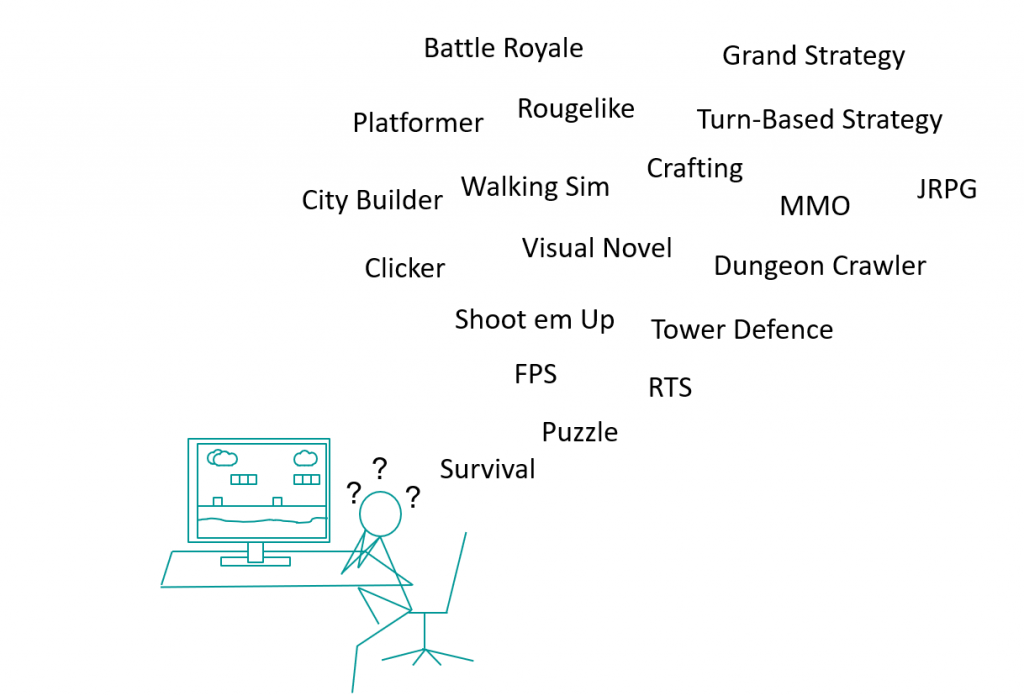
Deciding which game to make does not have to be rocket science. In fact, it comes down to 2 key considerations – supply and demand.
A platformer might be fun to make, but every single indie dev has made one and there’s only about 25 people (most of them indie developers) out there who’d like to play it.
Battle Royale on the other hand is super popular, but can you really compete with Fortnite, CoD, Apax Legends, PUBG etc? The first step should be to confirm that the proposed game has enough interest and that you’re not entering an overcrowded market.
Practical step-by-step guide to choosing which game to develop
In this guide, we’re using an example scenario where we want to develop a city builder simulation game. To determine the feasibility of this, we’re using the Video Game Insights Steam Analytics tool.
Selecting the right filters
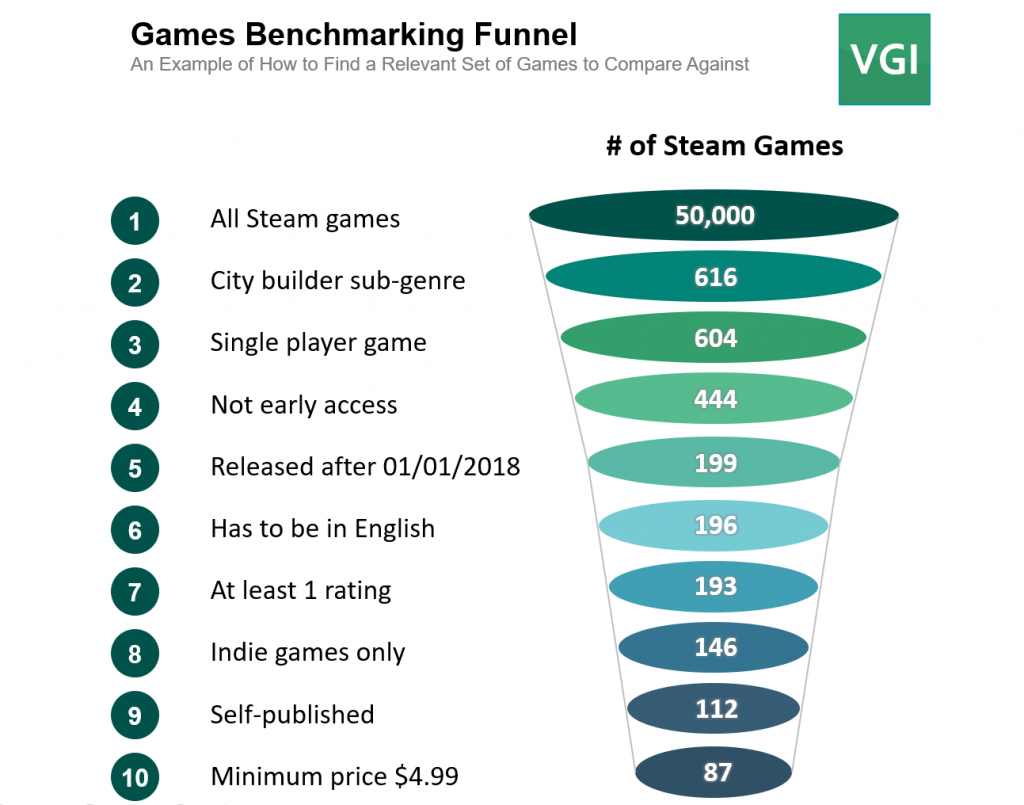
Game Characteristics
To determine the right games to compare to, we have to apply filters that get us to the closest comparable games. (We start with over 50,000 games as of January 2021)
- Genres and sub-genres – The most important factor to narrow your search is the sub-genre. In our example, we pick a city builder game. (We’re immediately down to only 616 games)
- Game mode – it’s a single player game and we won’t add multi-player to keep it simpler. (Down to 604 games)
Release and Performance
- Release type – It’s going to be a full game, not early acces. (444 games)
- Release date – We only care about the newer games as the industry changes quickly, so we set the release date to start from 2018. (199 games)
- Language – Our game is mainly for the western market, so it has to have at least English language. (196 games)
- Minimum raters count – We only include games with at least 1 rating to remove the low quality and hobby games. (193 games)
Publisher Overview
- Publisher classification – We only care about indie games. AAA and AA would distort our results. (146 games)
- Publishing – We only include self-published games only as that’s what we plan to do with our game. (112 games)
Business Model
- Minimum price – We’ll set that to $4.99 as we don’t want to include free and very cheap games. (87 games)
We have now funnelled down the list from over 50,000 games to just under 100. That’s a perfect sample size for our purposes – large enough to give us some statistical rigour, but targeted enough to focus on our specific game idea.
To sense check this, we click ‘See games’ under the overview section. This opens up a list of actual games that fit those filters.
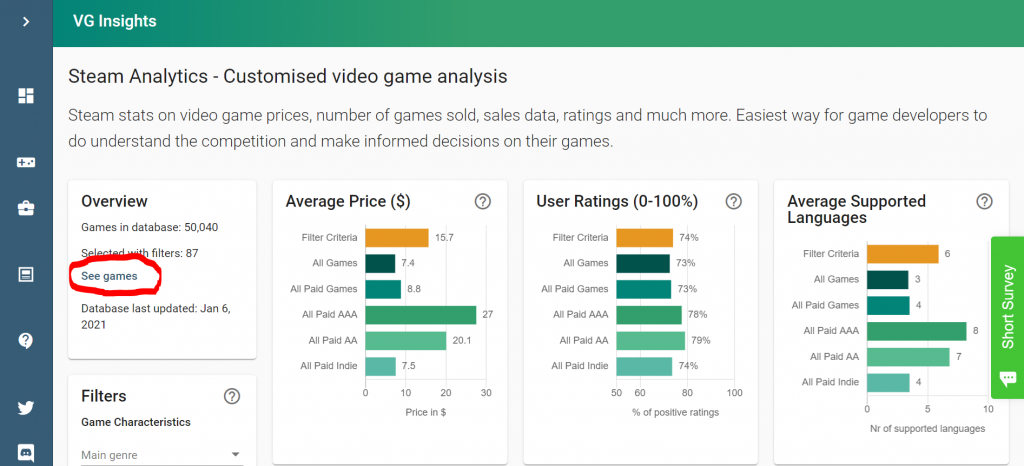
The first check is that these games are all in fact fitting our criteria – eg they are city builders with the right price range etc. We’re now going to click on some of them and check whether the games look in any way similar to what we’d make.
The list is automatically sorted by number of ratings, so we’re starting with the most popular of these games.
The first game in the list is ‘They are Billions’ – a steampunk colony builder – sounds relevant. ISLANDERS is a city builder on… an island. Again, it’s the right type of game. Dawn of Man is building cave man villages.
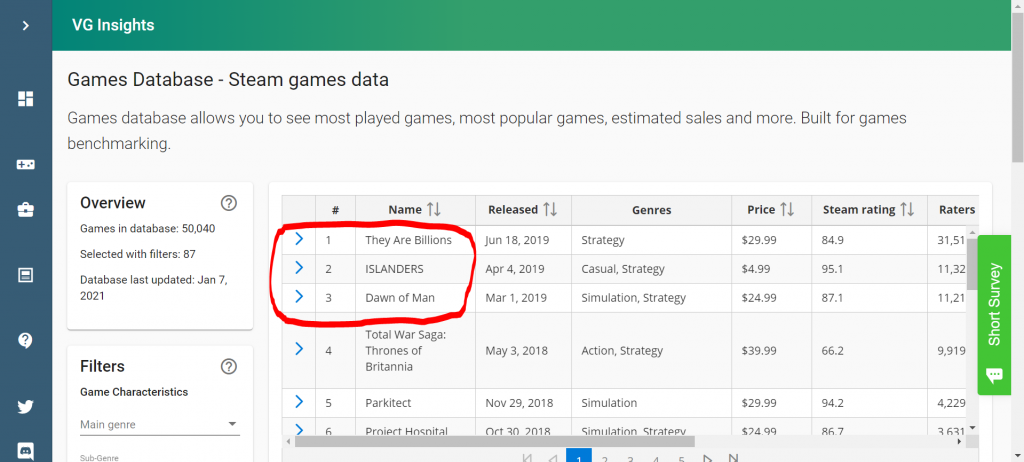
Okay, feels like we’ve got this right. The basic game mechanics are all similar to what we’re planning to do.
Determining if the type of game has been overproduced by other developers
We will now go back to the Steam Analytics page (your filters will be saved) and check the ‘# of games released over time’ graph. There were typically between 3-5 city builder games like that released per month in 2019. That’s decent competition, but compared to other sub-genres it’s actually quite low. For example, in the second half of 2020, about 100 platformer games were released each month.
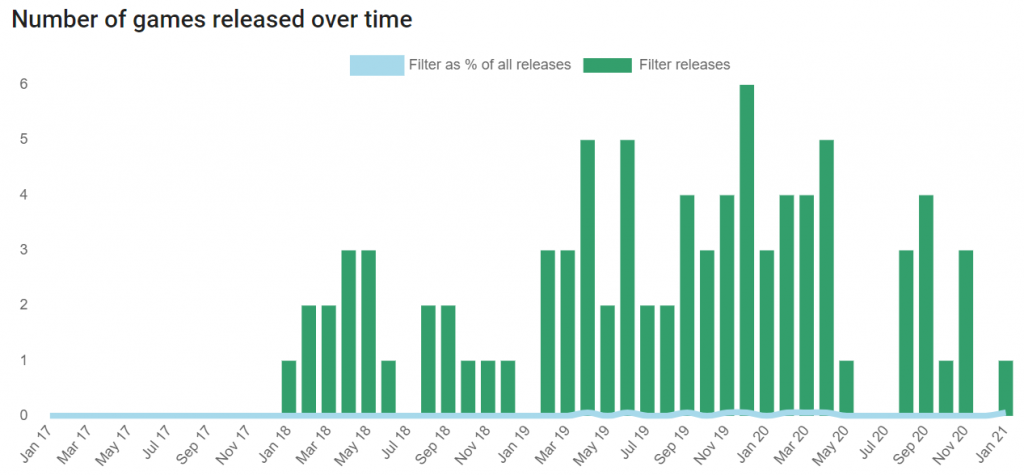
Determining which games are in demand
To understand how popular the game is, we will have to look at how the competing games have been rated and, more importantly, how many units they’ve managed to sell.
Firstly, looking at ratings, we can see that the benchmarked games, on average, get a rating of 74%, pretty much in line with other types of games. So they’re not necessarily better games.
However, prices for these games are, on average, $15.7, much higher than the overall average of $7.5. Nearly half of these games are priced between $10 and $20, suggesting that’s a good range to initially consider for your own game.
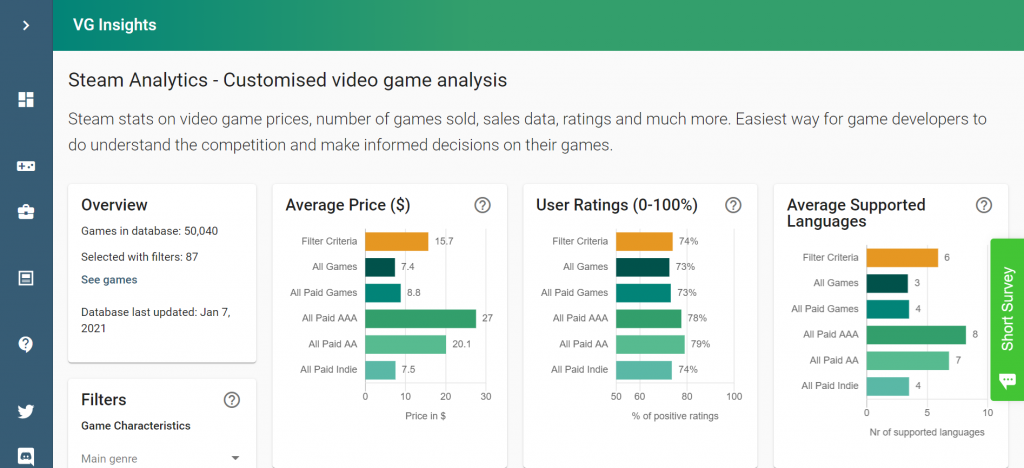
The next section to use is the average sales / average units sold graph which gives you an idea of how commercially successful games like this have been.
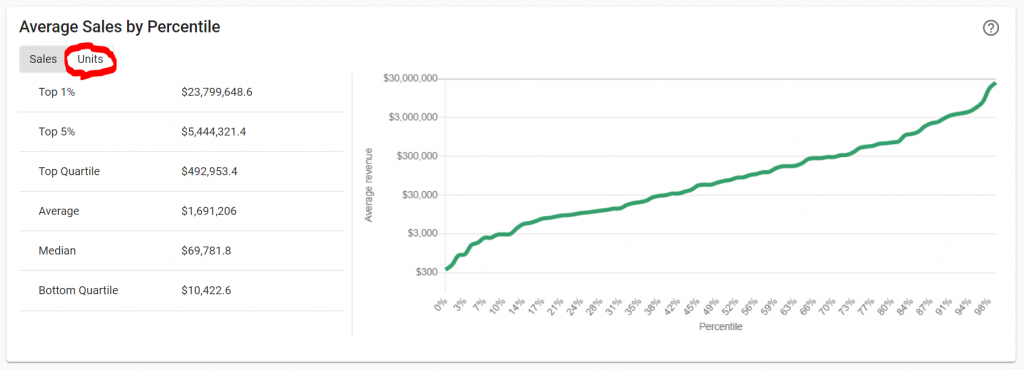
A typical game on Steam sells about 1,000 copies. City builders sell almost 6,000 – way more. There is a higher demand for games like this. Indies can provide good quality games in that space. This, together with the higher price also leads to significantly higher revenues for the developers.
The revenue distribution graph shows that only 14% of the games have made less than $5k in their lifetime. That’s really promising as over half of all games on Steam never make $5k.
In fact, more than half of the city builder indie games make over $60k. Almost 1 in 5 games like that make over $1 million. These numbers are huge compared to normal indies, making this sub-genre incredibly appealing.
Finally, we go back to the games list by clicking ‘see games’ under the overview section. We sort the games by # of ratings to see which games in the category have had most success.
You can then use the Steam pages to look at the gameplay specifics, graphics, user reviews and get much more detail around what specifically makes the successful games in that genre stand out.
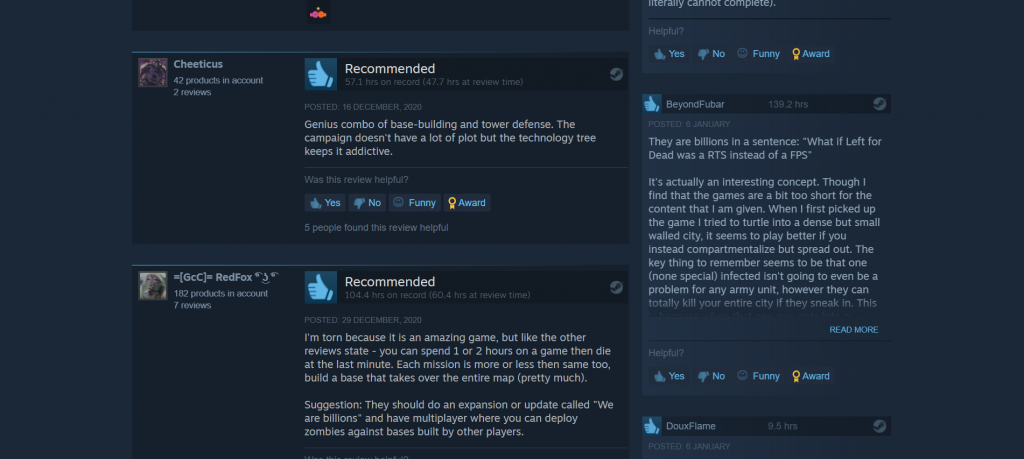
Should I consider making this game?
We’ve done about 10 minutes of research at this point and already know so much more about the game we are considering making. It’s not a fully quantitative approach and never should be. It’s not a ‘yes/no’ answer, but it does say that games like this are popular, but aren’t overproduced.
Of course, you can now spend more time on the platform and dig deeper before making the decision or you could do other forms of research. For example, you could do a simple survey and distribute that to your gamer friends to gauge their interest or do a more in-depth analysis of the success stories in your chosen category.
The good thing is that you’re now well on a path of making better educated decisions.
Explore the Steam Analytics tool to find out more useful information for game developers and enthusiasts alike!
The post How to choose which game to develop? – A step-by-step guide appeared first on Video Game Insights - Games industry data and analysis.